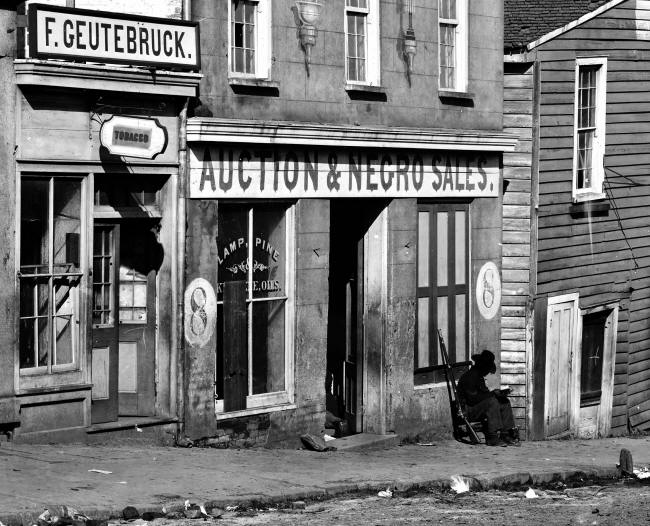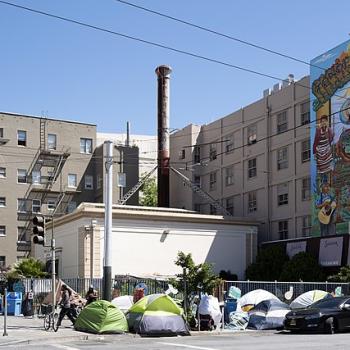
Slave market in Atlanta, Georgia in 1864. Photograph by George N. Barnard [public domain / Wikimedia Commons]
***
(3-3-04)
***
If we ask what was the major issue that divided the states (at least by the time of the Declaration of Independence and the drafting of the Constitution), it was clearly slavery.
That’s why I say that this is America’s “original sin.” It was wrong and could not be justified, and the South’s greatest minds, figures, and influences (Washington, Jefferson, Madison) knew this. It created what must have been tremendous cognitive dissonance.
The North, of course, was equally to blame, because it tolerated the institution, traded with the South for goods that were a result of it, passed fugitive slave laws, etc. And it goes without saying that the people in the North were every bit as much racist as Southerners were — if not even more so (then and now).
So this is not a “moral superiority of the North” tract; it is simply an analysis of American history with Christian ethics brought to bear. There is plenty of blame to go around. The North is much more morally bankrupt with regard to the leading moral issue of our time: abortion. And soldiers from North and South participated in the near-extermination of Native Americans from 1865-1890 (or at least the extermination of their culture and dignity, if not all of the people).
What I find curious is: why, if it’s correct that slavery was only a precipitating but not underlying cause of the Civil War, did the seceding states place it front and center in giving their reasons for secession?
For example, the Georgia statement concedes that “The question of slavery was the great difficulty in the way of the formation of the Constitution.” So even when referring back to the colonial period, slavery is right in the middle of the debate over federalism and the new constitutional republic.
The Mississippi declaration states: “Our position is thoroughly identified with the institution of slavery . . . a blow at slavery is a blow at commerce and civilization.”
And the Texas declaration made very clear what it was opposing in seceding from the union:
. . . an unnatural feeling of hostility to these Southern States and their beneficent and patriarchal system of African slavery, [Northerners were] proclaiming the debasing doctrine of equality of all men, irrespective of race or color– a doctrine at war with nature, in opposition to the experience of mankind, and in violation of the plainest revelations of Divine Law.
Now, if the problems were much deeper than this, and slavery was only on the surface, why were these declarations written in this manner, where slavery almost completely dominates the grievances?
The great ambivalence and guilt which the South’s greatest statesmen felt over slavery is apparent in a text from Thomas Jefferson which was removed from the final draft of the Declaration of Independence. He stated that King George II had:
. . . waged cruel war against human nature itself, violating its most sacred rights of life & liberty in the persons of a distant people who never offended him, captivating & carrying them into slavery in another hemisphere, or to incur miserable death in their transportation hither. The piratical warfare, the opprobrium of infidel powers, is the warfare of the Christian king of Great Britain, determined to keep open a market where men should be bought & sold. He had prostituted his negative [veto power] for suppressing every legislative attempt to prohibit or to restrain this execrable commerce . . . he is now exciting these very people to rise in arms among us, and to purchase that liberty of which he has deprived them by destroying those people upon whom he also obtruded them; thus paying off former crimes committed against the liberties of one people, with crimes which he urges them to commit against the lives of another.
Historian Page Smith, author of an eight-volume history of America, comments:
This effort to indict George III for the misery of slavery was surely one of the most exaggerated efforts in the history of political rhetoric . . . the king had aided and abetted, indeed had ruthlessly foisted slavery upon the defenseless Americans . . .
It should not take a trained psychologist to discern in this mistaken indictment the strength of Jefferson’s feelings about slavery. What we cannot bear to face ourselves, we are most prone to blame on others. Jefferson’s fear and horror are only too clearly manifest in these sentences . . . thus the paradox of a people claiming their rights as free men while holding other human beings as slaves might be obscured or somehow palliated . . .
But Congress would not buy a denunciation of slavery for a moment. Those delegates who were opposed to slavery felt the passage smelled of hypocrisy — not Jefferson’s, but Congress’s. Those who were disposed to defend the institution felt personally impugned by Jefferson’s attack on it. In short, it upset nearly everyone, making them either embarrassed, uncomfortable, indignant, or guilty; some of the delegates felt all of those unpleasant emotions . . . and Jefferson was certainly not the only Southerner whose deepest feelings were reflected in it. (A New Age Now Begins, Vol. I, New York: McGraw-Hill Book Co., 1976, 704-705)
Historian Forrest McDonald, in a book about the Constitution, wrote, concerning slavery:
Some Americans expressed concern about the matter. No small number of Virginia slaveholders, including Jefferson, Madison, and George Mason, agonized over it, though few made serious efforts to free their own slaves . . . Mason’s remarks in the Constitutional Convention were almost repetitive of Jefferson’s observations in his Notes on Virginia . . .
“. . . Every master of slaves is born a petty tyrant. They bring the judgment of heaven on a Country. As nations cannot be rewarded or punished in the next world they must be in this . . . providence punishes national sins, by national calamities.”
[Footnote 53: . . . “Madison’s difficulties in reconciling theory with the reality of slavery were clearly heartfelt. See his June 19 statement . . . ‘Where slavery exists, the Republican Theory becomes still more fallacious.’ “] (Novus Ordo Seclorum: The Intellectual Origins of the Constitution, Lawrence, Kansas: University Press of Kansas, 1985, 50)
[Dave: Mason sounds downright Lincolnesque . . . ]
James Madison nevertheless indulges in moral absurdities in his Federalist Paper No. 54, justifying the notion of slaves as 3/5 of a person legally and population-wise:
In being compelled to labor, not for himself, but for a master; in being vendible by one master to another master; and in being subject at all times to be restrained in his liberty and chastised in his body, by the capricious will of another — the slave may appear to be degraded from the human rank, and classed with those irrational animals which fall under the legal denomination of property . . .
The federal Constitution, therefore, decides with great propriety on the case of our slaves, when it views them in the mixed character of persons and of property. This is in fact their true character. It is the character bestowed on them by the laws under which they live . . .
Such is the reasoning which an advocate for the Southern interests might employ on this subject; and although it may appear to be a little strained in some points, yet on the whole, I must confess that it fully reconciles me to the scale of representation which the convention have established. (The Federalist Papers, New York: New American Library, 1961, 337, 340)
The self-contradiction in the “orthodox” Southern position prior to the Civil War is still evident in an essay by a Southerner in 1930, from the famous compilation of twelve Southern writers, I’ll Take My Stand: The South and the Agrarian Tradition (New York: Harper Torchbooks; reprinted 1962):
For ten years the South, already ruined by the loss of nearly $2,000,000,000 invested in slaves, with its lands worthless, its cattle and stock gone, its houses burned, was turned over to the three millions of former slaves, some of whom could still remember the taste of human flesh and the bulk of them hardly three generations removed from cannibalism. These half-savage blacks were armed . . . (Frank Lawrence Owsley, “The Irrepressible Conflict,” 62)
Yet Owsley states eleven pages later (p. 73): “Slavery, as we shall see, was part of the agrarian system, but only one element and not an essential one.”
Why, then (back to my earlier argument), do the statements of secession read the way they do? There the overwhelming concern is the potential horrific equality of the races as a central platform of Lincoln and the Republican Party, and the loss of $3 to $4 billion dollars worth of slave property. Hence, Owsley states:
The irrepressible conflict, then, was not between slavery and freedom, but between the industrial and commercial civilization of the North and the agrarian civilization of the South. (p. 74)
It was no essential part of the agrarian civilization of the South — though the Southerners under attack assumed that it was. (p. 76)
But this reasoning breaks down, too, once we realize that this agrarian society was based on slavery and free labor (to the tune of $2-4 billion, depending on whose figures we accept). Without that slave labor, all the wealth produced for the rich plantation owners would obviously be much less (just as corporate profits today would be much less without cheap overseas labor — some literally in slave camps, as in China).
Any way you look at it, the system rested upon slavery and free labor acquired therein. Otherwise, how could the South be “ruined”, according to Owsley, because it lost $2 billion worth of property (i.e., the human property of slaves), yet slavery at the same time was “no essential part” of the economy? That makes no sense. Elsewhere, he freely admits the financial goldmine:
[T]he invention of the cotton gin and the opening of the cotton lands in the Southwest, 1810-36, made the negro slave an economic instrument of great advantage. With the aid of the fresh cheap lands and the negro slave vast fortunes were made in a few years. Both North and South having now conceded that emancipation was impossible, the Southern planters made the most of their new cotton kingdom with a fairly easy conscience. They had considered emancipation honestly and fairly and had found it out of the question. Their skirts were clear. Let the blood of slavery rest upon the heads of those who had forced it upon the South. (p. 78)
Owsley also adopts the same silly, self-serving reasoning that Jefferson tried to include in the Declaration:
Slavery had been practically forced upon the country by England — over the protest of colonial assemblies. (p. 77)
So England forced America to be slaveholders and the North forced the South to do so also so plantation owners could make a fortune. Yeah, right.
Negroes had come into the Southern Colonies in such numbers that people feared for the integrity of the white race. For the negroes were cannibals and barbarians, and therefore dangerous. (p. 77)
If this weren’t enough justification, then Owsley gives us the coup de grace:
. . . slavery as a moral issue is too simple an explanation . . . as one of the many contributing causes of war it needs an explanation which the North has never grasped — in fact, never can grasp until the negro race covers the North as thickly as it does the lower South. (p. 68)
Be that as it may, Owsley virtually clinches my case for me when he states:
. . . had there not been slavery as an added difference between the agrarian South and industrial North, the two sections would have developed each its own political philosophy to explain and justify its institutions and demands upon the federal government. (p. 84)
If indeed slavery wasn’t the central or “essential” issue, then the South should have done what General Longstreet (who later converted to Catholicism) said: it should have freed the slaves before seceding. Then the righteousness of its cause would have been far more defensible, since it wouldn’t have been guilty of fighting for states’ sovereignty and freedom while upholding slavery, just as the American revolutionaries had been guilty of the moral absurdity of fighting for freedom from colonialism while sanctioning slavery in the Constitution.
I concede that the South had a legal right to secede, every bit as much as America did to secede from the British Empire (that’s not my issue). But in both cases, the “cause” was shot-through with a huge moral (not legal) self-contradiction: slavery. The American experiment was thoroughly flawed from its outset: slavery was the original sin.
The American flag represents slavery far more than the Confederate flag does (as black economist Walter Williams points out), because it flew over a nation of legal slavery for 89 years. Therefore, slavery is not a “Southern” flaw; it is an early American flaw that we all share, to our shame (in terms of history and heritage).
Pre-union exploitation of labor in the North and the sad history of subsequent race relations show us, I think, the root of the evils of slavery: cheap labor, racism, and class prejudice. Again, the South had no lock on these faults: it was a nationwide epidemic.
Today we face an evil exponentially greater than slavery ever was: child-killing. At least black slaves were allowed to live, by and large, and they were fed and housed; at least Indians had some length of life before it was snuffed out, and (in many cases) could defend themselves and their homelands.
Now, the greatest crime is to be in one’s mother’s womb. Preborn children are defined out of the sphere of the human race and legal rights. The Nazis killed 6 million Jews and perhaps 3-4 million more Gentiles in their camps. Stalin starved 10 million Ukrainians. That’s a Sunday picnic compared to America’s outrageous evils: we have “legally” slaughtered some 47 million babies. Hitler and Stalin murdered because of ethnic background; we murder simply because a human soul and body dares to come into existence apart from the God-like will and sexual and financial conveniences of one or both parents.
How far we have progressed . . . so some Northerners (and “good liberal” Southerners) want to look down their noses on Southerners for a fault that took place 139 or more years ago, while this abominable butchery takes place every day, day in and day out? Talk about beams in one’s own eye . . .
* * * * *













